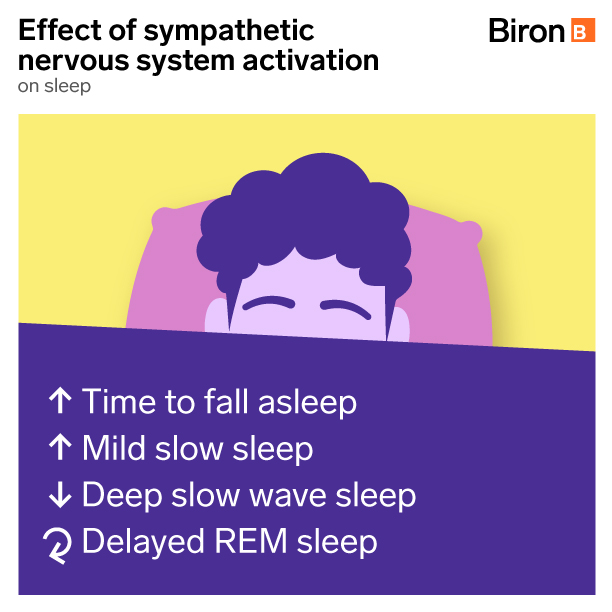Specialist Advice — 8 minutes
Anxiety and sleep deprivation: The chicken or the egg?

While it is generally recognized that people with anxiety suffer more from sleep deprivation than the rest of the population, studies also show that the lack of sleep could lead to anxiety disorders, even in those who do not usually suffer from them. In all cases, it appears clear that sleep and anxiety are closely linked.
People with anxiety sleep less well than others
Sleep duration depends on the individual and, while five or six hours are sufficient for some, ten hours are sometimes barely enough for others. Therefore, it is almost pointless to define the quality of sleep based solely on its duration. Rather, it is when sleep is regularly disturbed or interrupted that a sleep disorder is considered to exist.
In such cases, people with anxiety are believed to be more prone to nocturnal disturbances than others. Dr. Hélène Bouvier, a child psychiatrist at the Clinique d’intervention sur les troubles anxieux (CITA) at Hôpital Rivière-des-Prairies, confirmed this at a 2010 conference [1]. She conducted a study of 19 children and adolescents with anxiety in collaboration with Dr. Roger Godbout and his team, then compared the results to an equivalent group of young people without specific disorders. Their questionnaires on sleep habits revealed that young people suffering from anxiety have the following characteristics:
- They cannot sleep alone (95% vs. 0%).
- They had more nightmares (62% vs. 38%).
- They complained of unsatisfactory sleep (56% vs. 25%).
How does anxiety affect sleep?
Our autonomic nervous system is divided into two components: the parasympathetic system, which is responsible for calm and sleep states, and the sympathetic system, which is involved when the body is active and responding to stress. Anxiety, by its very nature, causes fear, stress and recurring thoughts that activate the sympathetic nervous system and sometimes lead to a state of hyper-arousal at sleep time. Dr. Pierre Mayer, Medical Director of Sleep Care at Biron, and Director of the sleep clinic at the CHUM’s Hôtel-Dieu hospital, believes that “when the sympathetic system is activated, it has the same effect as someone drinking coffee.”

This phenomenon can also be observed during sleep. For example, the heart rate of young people with anxiety is higher during the night than that in the control population (73.7 versus 65.7 beats per minute). This can create a lighter, more disturbed sleep, and result in varying periods of wakefulness during the night.
Lack of sleep can also cause anxiety
A study in November 2020 by a team led by Matthew Walker, Professor of neuroscience and psychology at the University of California, Berkeley, identified a new function of deep sleep which is believed to reorganize certain connections in the brain and reduce anxiety [2].
The research team had 18 young people watch disturbing videos following a good night’s sleep, then repeated the session after depriving them of sleep. Brain images showed that the area that helps control anxiety (medial prefrontal cortex) was disconnected after a bad night’s sleep. At the same time, they found that the deeper emotional centres were hyperactive. Professor Walker believes that “without sleep, it’s almost as if the brain presses too hard on the emotional gas pedal without the necessary brakes to stop.”
Conversely, after a good night’s sleep, anxiety levels decreased in the subjects studied. Therefore, it appears clear that a good night’s sleep helps reduce feelings of anxiety.
Solutions for analyzing and repairing sleep
Polysomnographic tests (i.e., exams carried out by specialists who use sensors to record different physical manifestations during sleep) can properly analyze the general quality of a subject’s sleep and be used to draw initial conclusions.
Then, a consultation in sleep hygiene or a cognitive-behavioural therapy can be considered. It works by treating the sleep disorder and the anxiety disorder separately. According to Dr. Mayer, “you have to treat the two problems separately if you want a convincing result.” Otherwise, even if the anxiety is cured or reduced, the sleep disorder may persist because of ingrained bad habits.
Combined with different relaxation and breathing methods, the therapy generally guarantees a significant improvement in a person’s sleep, since “this method not only makes it easier to fall asleep, but also reduces the number of awakenings,” says Dr. Mayer (video available in french only).

So, the chicken or the egg?
If indeed there has been a significant increase in anxiety disorders in the last decade or more, it goes hand in hand with a marked decrease in sleep in the population, especially in industrialized countries.
Between the endless variety of shows and videos available 24/7, extended working hours due to telecommuting, work-life balance, social networks and cellphones, there is no shortage of reasons to explain this phenomenon. Anxiety and lack of rest are intimately linked, making it important to find ways of improving sleep to reduce anxiety. It becomes a vicious cycle in which anxiety causes insomnia, which in turn exacerbates anxiety disorders. This awareness is essential in order to break the cycle.
As Professor Walker would say, “the best bridge between despair and hope is a good night’s sleep.”
For professional support, we’re here for you.
We provide services that can help your doctor diagnose sleep disorders and determine the appropriate treatment.
- Sleep Care services
- Online Screening
- Free remote consultation with our respiratory therapist
- Sleep hygiene program
You have question about an equipment? Chat online with our respiratory therapist.
Sources2
- Hôpital Rivière-des-Prairies. (2010). “Le sommeil ce n’est pas très reposant pour les anxieux.” Inter-Mission, Vol. 9, No. 6, p. 20-21. https://fondationsommeil.com/wp-content/uploads/2014/02/Le_sommeil_nest_pas_reposant.pdf
- Psychomédia. (November 8, 2019). “La tendance à l’anxiété est fortement influencée par le sommeil profond.” http://www.psychomedia.qc.ca/psychologie/2019-11-08/anxiete-sommeil-profond






